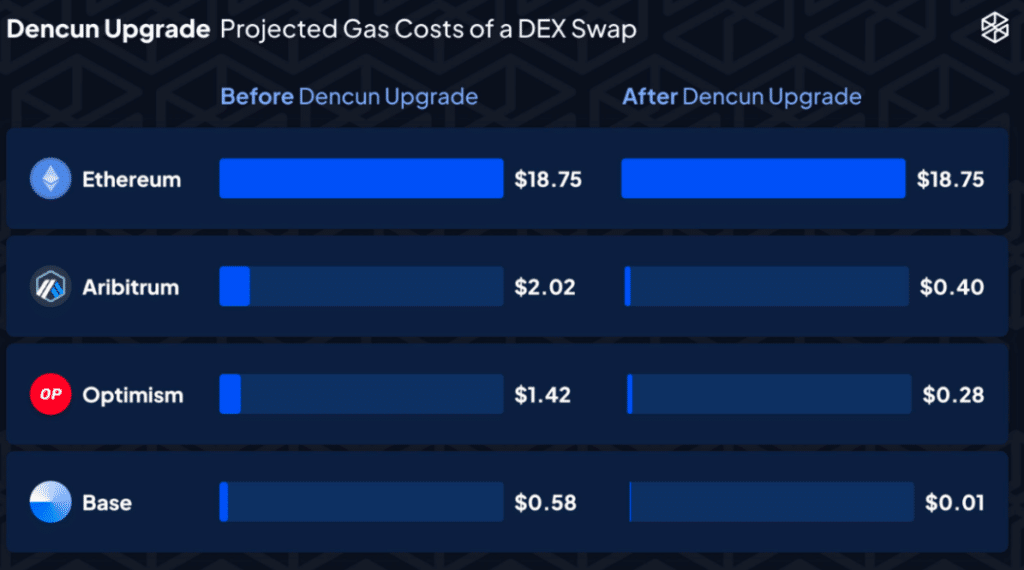Some crypto protocols have upgraded their smart contracts ahead of Ethereum’s anticipated hard fork on March 13 in an effort to be compatible with EIP-4844, a critical element of the upcoming Dencun upgrade.
Developers of zkSync performed a protocol upgrade yesterday to make the zero-knowledge-based rollup compatible with EIP-4844, said Daniel Lumi, senior product manager at Matter Labs, the software firm building zkSync. This prepares the layer 2 blockchain network to submit blob transactions, a new type of transaction that is expected to bring cheaper transactions across the various rollups built atop Ethereum’s settlement layer.
Gnosis Chain, a privacy-focused Ethereum sidechain, also enabled blobs after developers successfully activated the Dencun hard fork on the mainnet of the EVM-compatible blockchain network Monday afternoon, according to Gnosis Chain co-founder Martin Köppelmann.
Read More: How Much Will the Dencun Upgrade Really Reduce Ethereum Layer 2 Fees By?
David Tso, growth lead at blockchain data provider Covalent, commented on the upgrade, writing on Warpcast: “Gnosis can adopt Ethereum hard forks because it runs the same dual-layer stack with a ‘Beacon chain’ consensus layer that supports all the major Ethereum clients.”
The upgrades of Gnosis Chain and zkSync to enable blob transactions came two days before the Dencun upgrade rolls out on Ethereum’s mainnet, which is designed to enable lower network fees. Nansen data journalist Martin Lee told Unchained that Dencun is a “highly anticipated upgrade because fees of layer 2s, while they are much lower in fees than [Ethereum] by many orders of magnitude, are actually still quite higher than certain L1s like Solana where fees are just a couple of cents.”
Lower Fees
Data from onchain financial services platform IntoTheBlock projects that after Dencun rolls out the gas fee for a token swap on a decentralized exchange will substantially decrease on different layer 2s. IntoTheBlock estimates that users on Arbitrum, Optimism, and Base will see a more than 80% decrease in gas cost for a DEX swap to several cents.

Nansen’s Lee noted that “memecoin season” on rival blockchain Solana became popular and took up a large portion of the mindshare in the crypto space, in part because its low network fees meant that users could invest in new, high-risk projects at lower volumes without concerns that fees would outweigh smaller positions.
The expected outcome of Ethereum’s Dencun upgrade, a reduction in network fees, is important for pushing adoption and growth of L2s, potentially strengthening Ethereum’s meme culture, Lee noted. “Lower fees always helps with the velocity of money on the chain, [e.g.] how fast a certain dollar amount circulates throughout the ecosystem… We probably won’t see that kind of virality that we do see on Solana happen on L2s or [Ethereum] yet, but I wouldn’t be surprised if we see a stronger meme culture on various L2s and [Ethereum] itself,” Lee added.



